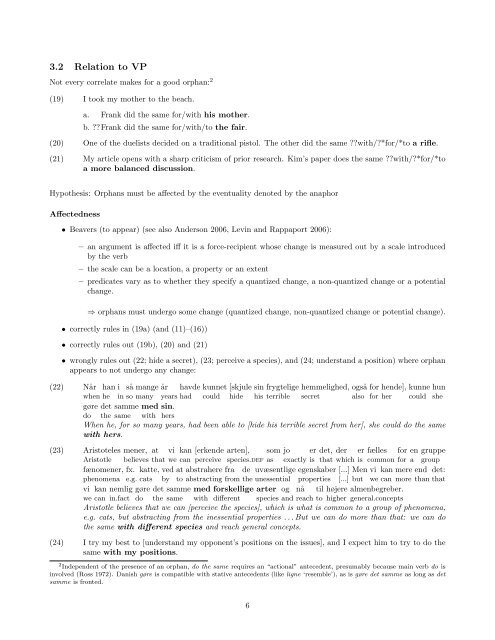handout - Linguistics
handout - Linguistics
handout - Linguistics
You also want an ePaper? Increase the reach of your titles
YUMPU automatically turns print PDFs into web optimized ePapers that Google loves.
3.2 Relation to VP<br />
Not every correlate makes for a good orphan: 2<br />
(19) I took my mother to the beach.<br />
a. Frank did the same for/with his mother.<br />
b. ??Frank did the same for/with/to the fair.<br />
(20) One of the duelists decided on a traditional pistol. The other did the same ??with/?*for/*to a rifle.<br />
(21) My article opens with a sharp criticism of prior research. Kim’s paper does the same ??with/?*for/*to<br />
a more balanced discussion.<br />
Hypothesis: Orphans must be affected by the eventuality denoted by the anaphor<br />
Affectedness<br />
• Beavers (to appear) (see also Anderson 2006, Levin and Rappaport 2006):<br />
– an argument is affected iff it is a force-recipient whose change is measured out by a scale introduced<br />
by the verb<br />
– the scale can be a location, a property or an extent<br />
– predicates vary as to whether they specify a quantized change, a non-quantized change or a potential<br />
change.<br />
⇒ orphans must undergo some change (quantized change, non-quantized change or potential change).<br />
• correctly rules in (19a) (and (11)–(16))<br />
• correctly rules out (19b), (20) and (21)<br />
• wrongly rules out (22; hide a secret), (23; perceive a species), and (24; understand a position) where orphan<br />
appears to not undergo any change:<br />
(22) N˚ar han i s˚a mange ˚ar havde kunnet [skjule sin frygtelige hemmelighed, ogs˚a for hende], kunne hun<br />
when he in so many years had could hide his terrible secret also for her could she<br />
gøre det samme med sin.<br />
do the same with hers<br />
When he, for so many years, had been able to [hide his terrible secret from her], she could do the same<br />
with hers.<br />
(23) Aristoteles<br />
Aristotle<br />
fænomener,<br />
phenomena<br />
mener, at vi kan [erkende arten], som jo er det, der er fælles for en gruppe<br />
believes that we can perceive species.def as exactly is that which is common for a group<br />
fx.<br />
e.g.<br />
katte,<br />
cats<br />
ved<br />
by<br />
at<br />
to<br />
abstrahere<br />
abstracting<br />
fra<br />
from<br />
de<br />
the<br />
uvæsentlige<br />
unessential<br />
egenskaber<br />
properties<br />
[...]<br />
[...]<br />
Men<br />
but<br />
vi<br />
we<br />
kan<br />
can<br />
mere<br />
more<br />
vi kan nemlig gøre det samme med forskellige arter og n˚a til højere almenbegreber.<br />
we can in.fact do the same with different species and reach to higher general.concepts<br />
Aristotle believes that we can [perceive the species], which is what is common to a group of phenomena,<br />
e.g. cats, but abstracting from the inessential properties . . . But we can do more than that: we can do<br />
the same with different species and reach general concepts.<br />
(24) I try my best to [understand my opponent’s positions on the issues], and I expect him to try to do the<br />
same with my positions.<br />
2 Independent of the presence of an orphan, do the same requires an “actional” antecedent, presumably because main verb do is<br />
involved (Ross 1972). Danish gøre is compatible with stative antecedents (like ligne ‘resemble’), as is gøre det samme as long as det<br />
samme is fronted.<br />
6<br />
end<br />
than<br />
det:<br />
that

















